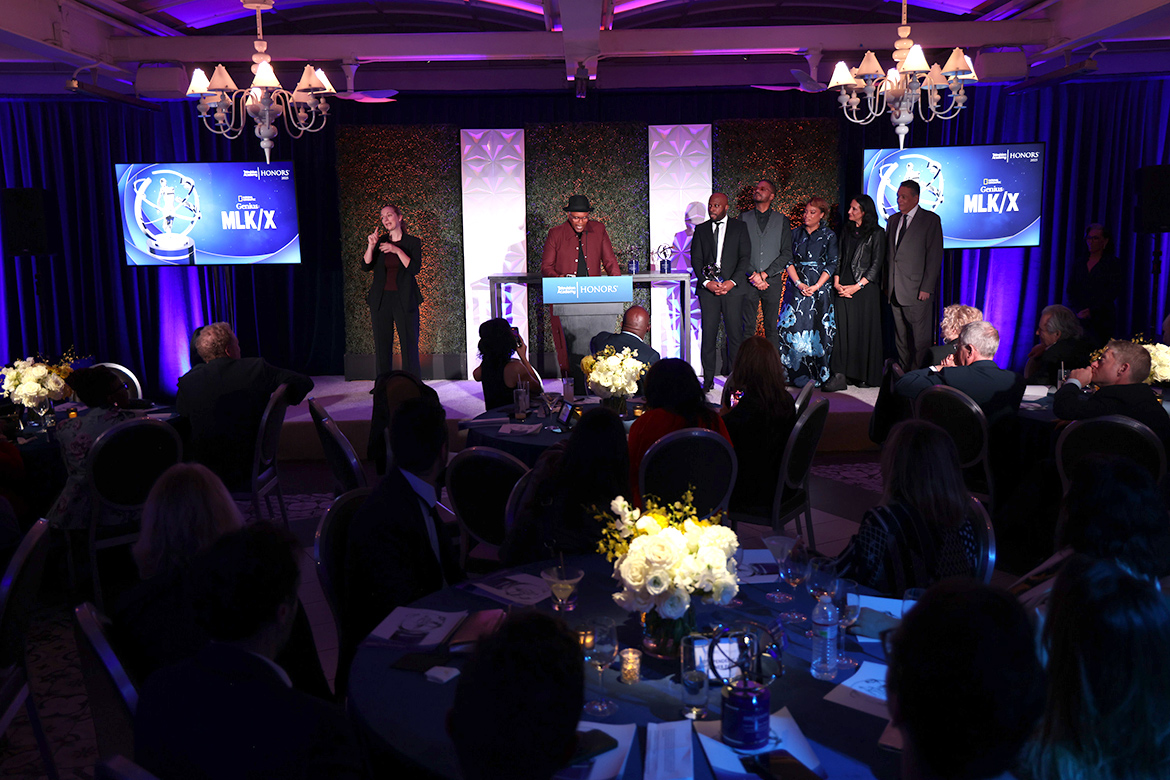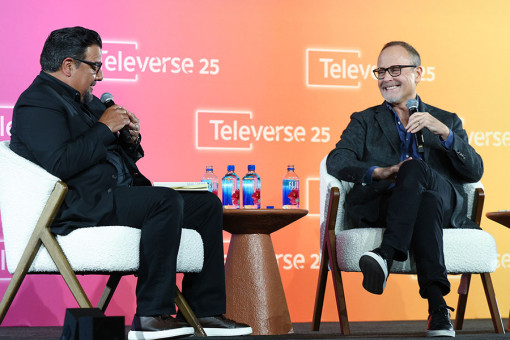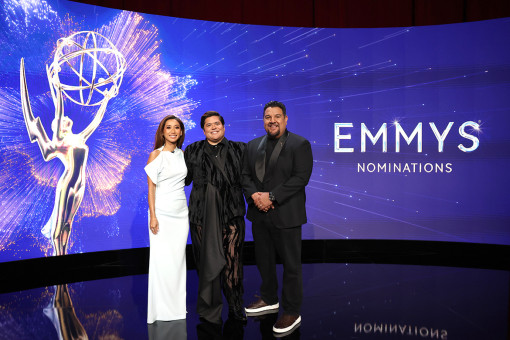Three days after the Hamas terrorist attack on Israel’s Nova music festival on October 7, 2023, documentary writer-director Yariv Moser was at the site of the massacre, to view the aftermath for himself. He went on to acquire mobile-phone footage of the horrific images taken by survivors, as well as videos from terrorists’ GoPro cameras, for an account of the day’s events that was as complete and authentic as possible.
The Paramount+ documentary that resulted, We Will Dance Again: Surviving October 7th, was one of six productions recognized at this year’s Television Academy Honors, which celebrates programming whose depiction of issues, events and causes not only entertains but educates and inspires viewers, often sparking or advancing social change. The 18th Honors ceremony, hosted by Michelle Visage, the four-time Emmy-winning senior producer-judge of RuPaul’s Drag Race, was held May 28 at the SLS Hotel in Los Angeles.
“For the last 17 years, the Television Academy Honors has been a bright light in the Academy's constellation,” Academy chair Cris Abrego said in his welcome. “The programming honored tonight showcases the absolute power our medium can wield: stories of profound social impact, positive social messaging or an unflinching eye to the truth. They are programs that are not only entertainment, but invaluable chronicles of our time. They are giant amplifiers of the voices that need to be heard, touchstones that help us understand ourselves and our worlds.”
On hand to accept his statuette, Moser called for the immediate end to the Israel-Hamas war and the safe release of the remaining hostages. As for his film’s recognition, “On behalf of all of us standing here, I would like to begin by expressing our gratitude to the Television Academy for this honor,” he said. “We wish to dedicate this award to the hundreds of victims, traumatized survivors and especially to the 20 living hostages who remain trapped in the tunnels of Gaza for over 600 days, many without food, water or even air to breathe. Every day they remain there puts their lives in further danger.”
In the United States, some existential battles don’t involve weapons and warfare but are still insidious in their own ways, such as the struggle of small, rural, multigenerational farms to exist in the face of agricultural corporations, climate change and unfavorable political policies. As relayed by the PBS series Independent Lens documentary Greener Pastures, more than 20,000 farms have gone bankrupt, and suicide rates among farmers are climbing. The farm community has begun to note the importance of mental health, however, as friends, family and neighbors come together to support those dealing with depression and despair.
“When we set out to make Greener Pastures,” director-producer Samuel-Ali Mirpoorian said after a “huge” thank you to the Academy, “our goal was simple, if not easy: to listen to the voices in the heart of our country that too often go unheard and to sit at the kitchen tables of American farmers and understand the immense pressure, the silent struggles and the mental health crisis unfolding in communities that are at the bedrock of our nation.
“This award really doesn't feel like it’s for us. It belongs to the families who led us into their lives with such vulnerability and trust, to the farmers who found the courage to speak the truth on camera, hoping it might help someone else feel less alone. Your bravery is the heart and soul of this film. We are forever grateful for your trust and for letting us share your story over five years.”
Nonfiction filmmakers are nothing if not patient: It took eight years to bring the Netflix documentary Daughters to the screen. The film follows the reunions of several girls with their incarcerated fathers for a dance presented by Date with Dad, a program of the Richmond, Virginia, nonprofit Girls for a Change, founded by Angela Patton to empower Black girls. The project launched when director Natalie Rea sent Patton an email asking if she could make a documentary about the dance. It took the two women — Patton became director-executive producer — three years just to obtain permission to film inside the prison.
“Thank you so much for this,” Rae said in acceptance. “This evening, these stories are so united in their humanity, and it’s been really inspiring hearing from you all and seeing more about the work. I’m also just incredibly grateful right now.” She continued, “Everyone who touched this project was willing to look at their own family wounds, was willing to bring the themes of unity and human connection and pour [them] into every frame of the project. So, thank you so much. This means a lot.”
 Reggie Rock Bythewood accepts for Genius MLK/X / Photo by: AP/Invision
Reggie Rock Bythewood accepts for Genius MLK/X / Photo by: AP/Invision
Black empowerment on a broader scale is chronicled in National Geographic’s Genius: MLK/X. This fourth season of the Genius anthology series dramatizes the lives of two icons of the Civil Rights movement, Reverend Martin Luther King Jr. and Malcolm X. The men are seen not only as the towering, passionate political figures they came to be, but in their roles as husbands, fathers, sons and brothers. And their wives, Coretta Scott King and Dr. Betty Shabazz, respectively, often considered only as supportive spouses, here have their own goals and dreams.
In acceptance, executive producer Reggie Roth Bythewood provided one of the evening’s own most empowering moments. “During the movement, civil rights activists were saying, ‘We shall overcome someday,’” he noted to the audience. “So, in honor of that, I'm going to ask you to repeat after me — you ready?” The audience was. “Someday. Is. Now.”
“We want to thank the Television Academy Honors for this recognition,” he added. “A special thanks goes to our amazing writing staff and editors. … In 1964, Malcolm and Martin met for the first and only time, when they got together at the [U.S.] Capitol building to push for the passage of the Civil Rights Act. They had the vision and the courage to challenge America to be better versions of itself. They didn’t give in then. Let us not give in now. Hold on to the dream, by any means necessary. Why? Someday is now.”
Both civil rights leaders were known as compelling speakers. In the Disney+ movie Out of My Mind, about a teenage girl with cerebral palsy who wants to live as normally as possible, the lead character Melody is nonverbal and uses a wheelchair, but via a speech-assistance device still has plenty to say. Her primary, positive message: We are not defined by our disabilities and thrive despite them. The filmmakers cast Phoebe-Ray Taylor, who has cerebral palsy, as Melody and hired people with other disabilities for jobs on-screen and off.
Judith Light, who plays supportive next-door neighbor Mrs. V and is a longtime advocate for those who are marginalized, spoke about the “powerful, moving, funny, heartwarming story,” adapted from Sharon M Draper's novel, before introducing producer Peter Saraf.
“You may or may not know someone who has a disability like Melody’s,” she said. “You may feel uncomfortable around people with disabilities, or not know what to say. Or maybe this movie will inspire you to just say ‘Hello,’ or try to find a way to listen to what they have to say.
“Or maybe you'll go a lot farther, and [referring to plot points] be the neighbor who waits at the doorstep in the pouring rain to collect the most important package of that young girl's life, or maybe, just maybe, make her shoes that are as sparkly as her soul.”
Said Saraf in acceptance, “We are so grateful to the Academy for recognizing Out of My Mind with this award. You have chosen to amplify not just this story, but the many stories of people living with disabilities, which are all too often left untold. Making this film was a profound learning experience, and one of the most lasting lessons we came away with is that when we look for people's potential, instead of only their limitations, we enrich ourselves as much as we include someone else.
Sound editors peer group governor Bobbi Banks and reality programming peer group governor Scott Freeman are cochairs of the Television Academy Honors Selection Committee. The Academy Honors was created by production designer John Shaffner, then cochair of the Academy’s social outreach committee who later became Academy chair and CEO, and developed with committee cochair Lynn Roth and former Academy chair Dick Askin.












